Democrats Push for Radiation Compensation Act Revival Amid GOP Resistance
Democrats urge action on stalled Radiation Exposure Compensation Act, highlighting its importance for those affected by nuclear testing and uranium mining. Republican concerns over costs hinder progress despite Senate approval.

Pete Aguilar, Democratic Caucus Chairman, has called for increased public pressure on Republican House leaders to revive the Radiation Exposure Compensation Act (RECA). The act, which expired in June 2023, aimed to compensate individuals affected by nuclear testing and uranium mining activities conducted by the U.S. government.
The RECA, initially passed over three decades ago, has distributed approximately $2.6 billion in compensation. The proposed extension would have expanded coverage to include additional states and territories affected by nuclear activities.

The Manhattan Project, which produced the first nuclear weapons during World War II, has left a lasting impact on communities across the United States. The Trinity Test, conducted on July 16, 1945, marked the first detonation of a nuclear weapon and exposed nearby residents to radioactive fallout without warning.
Gabe Vasquez, a freshman Congressman from New Mexico, criticized the inaction on RECA, stating:
"when you tell me that we can't afford to compensate people who have suffered through pancreatic cancer, miscarriages, the horrors of nuclear fallout and the generation that have suffered from it."
The Navajo Nation, covering over 27,000 square miles across Arizona, New Mexico, and Utah, has been particularly affected by uranium mining. From the 1940s to the 1980s, over 30 million tons of uranium ore were extracted from Navajo lands, leaving a legacy of contamination and health issues.
The term "downwinders" refers to individuals and communities affected by radioactive contamination from nuclear weapons testing. The National Cancer Institute estimates that nuclear testing at the Nevada Test Site alone could cause between 11,000 and 212,000 thyroid cancers.
Recent attention to the issue has been fueled by the release of the "Oppenheimer" movie in 2023, which reignited public interest in the Manhattan Project and its consequences. This renewed focus has highlighted the ongoing struggles of affected communities, including the Marshall Islands, which still grapple with contamination and health issues decades after U.S. nuclear testing.
Vasquez proposed including the RECA legislation in defense spending measures, noting the $860 billion annual national defense budget. He suggested finding ways to offset the cost by saving money elsewhere in the budget.
The U.S. Department of Energy has identified 439 uranium mines on Navajo land requiring cleanup, underscoring the extensive environmental impact of nuclear activities. The Navajo Nation has maintained a moratorium on uranium mining since 2005 to prevent further contamination.
As the debate continues, advocates emphasize the government's responsibility to compensate those affected by its nuclear programs. With the current date being August 13, 2024, it has been over a year since the act's expiration, leaving many affected individuals without access to compensation.
The ongoing discussion surrounding RECA highlights the long-term consequences of nuclear testing and uranium mining, which continue to affect communities decades after the activities ceased. As the United States conducted over 1,000 nuclear tests between 1945 and 1992, the legacy of these actions remains a pressing issue for many Americans.


































